-
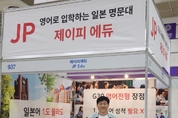
JP EDU - Hidden Opportunities in Japan: English-Taught International Studies Programs Open Doors to Prestigious Universities
Can you enter a top Japanese university without speaking Japanese? Can you enter a top Japanese university without speaking Japanese? Surprisingly, the answer is yes. Much like Korea’s Yonsei University Underwood International College or the Songdo Global Campus, more than 40 Japanese universities now offer full-degree programs conducted entirely in English. These English-taught programs—often called G30 programs—are especially popular in the field of International Studies. Admission is based on a student’s academic record (GPA) and English proficiency, rather than Japanese language ability. Applicants are assessed through English proficiency tests such as TOEFL or IELTS, as well as personal essays. A Growing Interest in Japan’s English AdmissionsAs awareness of Japan’s English admissions has grown, more students are turning to specialized educational institutions for guidance. One such institution is JP Edu, which focuses on preparing students for Japan’s G30 admissions. Traditionally, international applicants to Japanese universities needed to take the EJU (Examination for Japanese University Admission for International Students), a process that can take up to two years of language study and test preparation. In contrast, the English admissions pathway allows qualified students to apply much sooner—sometimes after just three to six months of English-focused preparation. “Several years ago, parents could hardly believe it was possible to enter a Japanese university without knowing any Japanese,” says Director Hyeong-ho Doo of JP Edu. “Now, the system has become well-known, and many families come to us after researching online or visiting education fairs. The interest keeps growing every year.” At a recent Study Abroad Fair at COEX, Doo observed long lines of parents and students waiting for consultations—clear evidence of the rising popularity of Japan’s English-taught International Studies programs. Career Advantages in a Changing Job MarketDirector Doo also points out Japan’s demographic challenge: a declining birthrate that began over 30 years ago has now created labor shortages across industries. “Japan needs skilled workers,” he notes. “Students who complete an English-taught degree in Japan, then learn Japanese and gain global experience, are in a strong position for employment.” Many graduates of these programs spend a year abroad—studying in the U.K., U.S., Australia, or France—before returning to Japan. Some later join major Japanese corporations, and even move on to leading Korean companies as experienced professionals. “The International Studies Department in Japan is a hidden treasure,” Doo adds. “It offers language immersion, international experience, and career pathways that few other systems can match.” Why Expert Consulting MattersWith growing competition for these English-taught programs, early preparation has become essential. Director Doo recommends applying six months to one year in advance to improve success rates. “Some students apply on their own or through other agencies and get rejected,” Doo explains. “Then they come to us for help. The process is not as straightforward as applying to universities in Hong Kong or Singapore—it’s more complex, and each Japanese university has unique requirements.” Domestic Korean students, he adds, often have strong study habits but inconsistent grades, while international school students may have good GPAs but weaker academic fundamentals. JP Edu bridges these gaps through targeted preparation. In fact, JP Edu operates as a full-fledged English proficiency training center, offering courses in TOEFL, IELTS, SAT, ACT, and AP. Its expertise lies in helping students who may not reach top Korean universities discover new opportunities abroad. “For students who want a world-class education without the fierce domestic competition,” Doo says, “Japan’s English admission programs offer a realistic and strategic alternative.” JP EduTel: 02-3463-0101www.jpedu.net [대한민국영어신문]
- 관리자 기자
- 2025-11-04 13:48
-
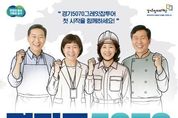
Gyeonggi Province to hold its largest job fair for middle-aged and older workers on the 9th. 1,000 jobs to be filled.
Gyeonggi Province will hold the “2025 Gyeonggi Province 5070 Job Fair” on the 9th at Suwon Messe. Starting with this fair, the province will launch the “Gyeonggi 5070 Great Job Tour (Gray it-job tour)” in the second half of the year, visiting all 31 cities and counties in the province. The “Gyeonggi Province 5070 Job Fair” is a customized employment linkage event targeting middle-aged and older adults aged 50 to 70. This year, it is particularly noteworthy for including enhanced “career transition support functions” compared to last year. It goes beyond simple on-site hiring, offering introductions to related job sectors and customized program guidance for middle-aged individuals seeking career changes. Through counseling and information provision tailored to job seekers' experience and desired roles, the event aims to reduce anxiety about career transitions and expand their options. About 1,000 people are expected to be hired at this fair, with about 100 companies participating, including KB Golden Life Care and CJ Freshway. In particular, KB Golden Life Care will hire about 100 full-time employees on-site to secure manpower for Gwanggyo Village, which is scheduled to open in September. The fair will feature ▲job fairs ▲job fairs/promotion booths ▲job preparation booths ▲job experience booths ▲celebratory performances, and other diverse programs. At the job fairs, representatives from large and medium-sized companies will directly explain job duties and working conditions. Additionally, over 30 related institutions, including the Korea Asset Management Corporation, the Korea Housing Finance Corporation, and the Labor-Management Development Foundation, will participate to provide customized counseling on employment, entrepreneurship, welfare, and finance. Gyeonggi Province plans to actively promote middle-aged-friendly employment policies such as “Baby Boomer Light Jobs” and “Baby Boomer Internships” through this fair. Job seekers aged 50 to 70 can apply in advance through the fair's website or by phone, and can also participate on the day of the event after registering on-site. All procedures, including resume writing, photo shooting, and employment consulting, will be supported on-site. Jeong Doo-seok, Director of the Gyeonggi Province Economic Affairs Bureau, stated, "The second baby boom generation, born between 1964 and 1974, began turning 60 last year. This generation, numbering 9.54 million, is the largest demographic group in our society, making employment stability and re-employment support extremely important at this time. Gyeonggi Province will strive to improve the employment environment for middle-aged and older adults through the 5070 Job Fair.” [News Source: Gyeonggi Provincial Office]
- 관리자 기자
- 2025-07-09 06:30
-
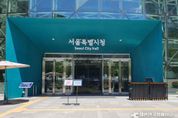
Seoul City establishes a foothold for K-Beauty and fashion to enter the European market, promoting Milan as a base
The K-Beauty and Fashion industry has set its sights on expanding into Europe, beyond the US, Asia, and the Middle East, by making its debut in Milan, Italy—the heartland of fashion. The industry is formalizing global collaborations to support emerging designers in their European market entry and directly engaging with Milanese citizens to showcase the charm of K-Beauty and Fashion. After completing his schedule in Vienna, Austria, Seoul Mayor Oh Se-hoon arrived in Milan and visited the headquarters of the Italian National Fashion Chamber (Camera Nazionale della Moda Italiana, CNMI) at 11 a.m. local time on the 4th. There, he expressed his commitment to strengthening the global partnership between the two cities through fashion. Additionally, he discussed plans to expand mutual exchanges and cooperation between Seoul Fashion Week and Milan Fashion Week. CNMI is the organizer of Milan Fashion Week, one of the world's four major fashion weeks, and contributes to enhancing the global status of Italian fashion through sustainability, digitalization, diversity and inclusivity, and the promotion of emerging brands. Seoul City and CNMI, which signed a business agreement in February last year, promised to engage in closer and more continuous exchanges in the fields of fashion and beauty through this meeting. The two organizations signed an agreement with the following main contents: to promote innovation in the fashion industry by establishing a system to utilize the Milan Fashion Week platform for mutual cooperation between Seoul Fashion Week and Milan Fashion Week and for the international promotion of Korean brands; and to enhance exchange and cooperation between relevant organizations and groups in each city related to fashion and beauty, including fashion material supply, product design, and marketing communication. At the event, Mayor Oh proposed that brands participating in Milan Fashion Week join Seoul Fashion Week. This initiative aims to establish a platform for Milan's representative brands to participate directly in Seoul Fashion Week, thereby elevating Seoul Fashion Week to a globally recognized top-five fashion week. At 6 p.m. local time on the same day, Mayor Oh visited the pop-up exhibition hall “K-Vibe from Seoul,” which was decorated with Seoul's beauty and fashion and K-pop, at Milan's representative boutique “10 Corso Como,” and directly introduced the charm of Seoul as a “Fun City” where beauty and style blend together to the citizens of Milan. In addition, he listened to the voices of domestic beauty and fashion brands participating in the event and sought practical ways to expand overseas. The two-day event, held on the 4th and 5th, featured eight promising domestic beauty brands (▴Villa Erbatio ▴Bihop ▴Eden ▴Pikam ▴Nola Hour ▴Round Lab ▴Bentone ▴Van Cleo) and six fashion brands (▴Triple Flute ▴Valoren ▴Duck Dive ▴BS Rabbit ▴Joseph & Stacy ▴Numbering) participated directly to meet Milanese citizens. (K-Beauty & Fashion Product Exhibition) Promising Seoul-based beauty and fashion brands targeting the European market shared popular skincare methods and fashion styling tips directly with attendees. (Experience K-Lifestyle) Products such as rice makgeolli and dalgona latte, which incorporate Korean F&B elements into fragrance, were unveiled, along with an experiential event featuring dalgona from the globally popular “Squid Game.” (Meetings with local influencers) Active local beauty and fashion influencers networked with participating brands and shared the event atmosphere and product reviews through their social media channels, enhancing the global recognition of Seoul brands. Currently, South Korea has risen to the third-largest cosmetics exporter globally (10.2 billion dollars) as of 2024, but Europe remains outside the top 10 major export destinations. This indicates that the European market holds significant potential as a promising market for the K-Beauty industry. The Seoul Metropolitan Government plans to use this Milan event as a starting point for its European market expansion efforts. Meanwhile, the Seoul Metropolitan Government is providing multifaceted support to upgrade the K-beauty and fashion industries from mere consumer goods to cultural content that grows alongside K-culture, including overseas market development, global marketing support, human resource development, and participation in overseas fashion weeks. First, with the goal of becoming a “global beauty industry hub,” Seoul hosts the “Seoul Beauty Week” every year as a global business platform. “Seoul Beauty Week” is an event aimed at strengthening the competitiveness of the K-Beauty industry, which is gaining global attention thanks to the popularity of K-pop content. Last year, the three-day event attracted a total of 50,000 visitors, including citizens, tourists, and beauty industry professionals. Notably, over 200 buyers from 39 countries, including Japan's ARATA, participated in the event, conducting 1,049 one-on-one export consultations with 207 promising small and medium-sized beauty companies, resulting in approximately $39 million (about 53.3 billion won) in order contracts. In addition, the Seoul Beauty Hub, which provides comprehensive support for the entire process of design, distribution, and export for beauty companies, opened in June. This year, it will support 100 companies in entering overseas markets and help with online and offline marketing and training specialized personnel for the beauty industry. It also helps competitive K-fashion brands enter overseas markets. In addition to supporting participation in Milan Fashion Week, the city will connect promising buyers through the Seoul Fashion Week Trade Show held every February and September and provide consulting services to increase orders. It will also support the global expansion of promising small and medium-sized brands participating in the “Hi Seoul Showroom.” In addition, the Seoul Metropolitan Government is currently developing a plan to revive Dongdaemun as a fashion and beauty mecca in South Korea. First, the DDP area will be transformed from a simple visitor space into a stay-and-enjoy consumption space by integrating various contents such as beauty, fashion, and K-culture, and expanding the brand value derived from citizen-participatory festivals to the surrounding commercial areas, thereby developing it into a complex consumption hub where fashion and culture converge. At 7 p.m. local time, the final event of the day, a roundtable discussion with Milan-based Korean companies, took place. At the roundtable, which was attended by the director of the Korea Trade-Investment Promotion Agency (KOTRA) Milan Trade Office and local business leaders, Mayor Oh listened attentively to the participants' opinions and stated, “We will continue to provide steadfast support to help Seoul's brands gain a stronger presence on the global stage.” He emphasized, “Seoul's competitiveness is the nation's competitiveness. With the belief that Seoul's success will enable Korean companies to grow further, we will serve as a strong foundation.” [News Source: Seoul City]
- 관리자 기자
- 2025-07-09 06:25
-
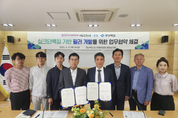
Pilkocospharm Co., Ltd. Signs MOU with Gyeongbuk Silkworm & Insect Business Center for Joint Development of Next-Generation Bio-Fillers
Pilkocospharm Co., Ltd. Signs MOU with Gyeongbuk Silkworm & Insect Business Center for Joint Development of Next-Generation Bio-Fillers Pilkocospharm Co., Ltd. (CEO Jung Hoon-cheol) is partnering with the Gyeongbuk Silk & Insect Business Center to embark on the development of next-generation bio-fillers. On June 12, the two organizations signed a Memorandum of Understanding (MOU) at the Silkworm & Insect Business Center in Sangju, Gyeongbuk, agreeing to collaborate on the development of dermal fillers using insect-derived biological resources, including silkworm cocoons. This agreement aims to strengthen cooperation in a wide range of areas, including research and development of new materials, product commercialization, and advancement into the global eco-friendly beauty market. Introduction to Pilkocospharm Co., Ltd. and Its Core Competencies Pilkocospharm Co., Ltd. is a rapidly growing company in the domestic and international markets, specializing in functional cosmetics and medical aesthetics, with strong R&D-based manufacturing capabilities. The company’s product portfolio and strengths include: Specialized product lines such as skin boosters, injectable ampoules, lifting solutions, and hair-loss treatments Consumer-friendly home care cosmetics including ampoules, mask packs, and repair creams Medical device-integrated products for hospitals and aesthetics Freeze-dried ampoule and powder formulation development with stable, high-functionality active ingredients Recently, Pilkocospharm Co., Ltd. has focused on developing preservative-free, high-purity skin boosters and ampoules using lyophilization (freeze-drying) technology. This allows the biological stability and efficacy of active ingredients to be maximized by activating the formulations just before use - a key technology that offers a competitive edge in the high-end medical and aesthetic markets. Key formulation expertise includes: Ingredients such as PLLA (poly-L-lactic acid), peptides, exosomes, and more A full-service OEM/ODM system Mitochondrial activation & skin homeostasis The company also holds multiple international certifications, proving its competitiveness: ISO 9001 (Quality Management) ISO 14001 (Environmental Management) ISO 13485 (Medical Device Quality Management) ISO 45001 (Occupational Health and Safety Management) ISO 22716 (GMP, Good Manufacturing Practices) Pilkocospharm Co., Ltd. has secured global certifications such as the European CPNP, China’s NMPA, and the U.S. MoCRA and is actively collaborating with buyers from 20 countries. CEO Jung Hoon-cheol stated, “This agreement marks a significant turning point, accelerating the convergence of Pilkocospharm Co., Ltd.'s science-based functionality with eco-friendly natural raw materials.” An official from the Gyeongbuk Silk & Insect Business Center added, “This collaboration is meaningful not only for the industrialization of research but also for revitalizing the local bio-industry ecosystem. We aim to create a new business model by integrating our technology with the bio-filler.” Moving forward, the two organizations plan to establish a sustainable and mutually beneficial partnership through ongoing technology exchanges, joint research, prototype development, and participation in global exhibitions. [대한민국영어신문 나윤재 기자]
- 관리자 기자
- 2025-06-16 14:19
-
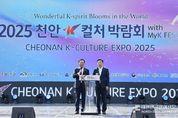
Coloring the world, the Cheonan K-Culture Expo comes to a close... Proving itself as a representative cultural industry expo
The 2025 Cheonan K-Culture Expo, held over five days under the theme “Global K-Culture, Coloring the World,” closed on the 8th after attracting domestic and international tourists. The K-Culture Expo, which opened on the 4th, came to a close with the K-Talk Show “NoBack Tak Jae-hoon,” the Cheonan Foreigners' Festival, the closing ceremony, and the closing reception. Now in its third year, the K-Culture Expo showcased a variety of K-pop culture content blending culture and technology, reaffirming its reputation as Korea's leading comprehensive cultural industry expo. From K-pop performances such as the K-Retro Concert, K-OST Concert, and ‘SBS Power FM Wendy's Young Street’ to themed exhibitions, food, beauty, webtoon, video content, game, and Korean language industry exhibition halls, industrial conferences, and K-Hanbok Fashion Shows, the event showcased the diversity of the cultural industry. To explore the present and future of the K-content industry and enhance the competitiveness of the cultural industry in the AI era, AI, immersive media, extended reality (XR), and interactive technologies were introduced in each exhibition hall to enhance immersion. Programs that visitors could enjoy together, such as K-POP random play dance and street karaoke, were held, and an experience zone with about 50 experience booths was set up, where visitors could participate in traditional games and craft experience programs. 1,000 drones lit up the night sky with K-culture themes, and the Independence Hall of Korea was open at night for the second year in a row, providing nighttime attractions. This festival was a participatory event created jointly by local small business owners, companies, and communities, and was followed by cultural events linked to the K-Culture Expo, such as a Memorial Day tribute concert, a youth artist festival, a K-indie showcase, and a veterans' cultural festival. In particular, despite the large crowds that gathered at the expo site over the five days, the event was held without a single safety incident, demonstrating a high level of visitor culture. At the grassy area in front of the main stage, families, couples, and friends gathered in small groups, spread out blankets, and enjoyed the performances. They sang along to the songs performed by the artists on stage, creating a vibrant cultural scene where visitors and K-Culture came together. Kim Seok-pil, Acting Mayor of Cheonan City, stated, “This K-Culture Expo served as a platform to introduce our culture to the world and foster understanding across generations and borders through K-Culture. We will continue to develop cultural platforms to establish Cheonan as a representative cultural city of Korea and a hub for K-Culture.” [News Source: Chungcheongnam-do Cheonan City]
- 관리자 기자
- 2025-06-09 22:54
-
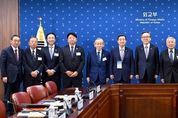
Minister Cho Tae-yeol of Foreign Affairs meets with a delegation from the Japan-Korea Economic Association
On the afternoon of May 26, Minister of Foreign Affairs Cho Tae-yul met with a delegation from the Japan-Korea Economic Association, including Vice Chairman Aso Yutaka, who visited South Korea to attend the 57th Japan-Korea Economic Conference (May 27-28), and exchanged views on economic cooperation between the two countries. Minister Cho expressed gratitude for the Japan-Korea Economic Association's significant role in promoting exchanges and creating cooperation opportunities between companies of both countries, and urged the business communities of both countries to continue playing an active role to sustain the momentum of improved friendly cooperation between Korea and Japan, which has been difficult to achieve recently. In particular, he emphasized the need for the two countries, which are facing similar challenges due to the rapidly changing trade environment, to maintain close communication at the government and business levels, while also expanding cooperation within the framework of the trilateral cooperation between South Korea, the United States, and Japan. In addition, he noted that the Korean Pavilion at the Osaka Expo currently underway in Japan has secured a spot among the top three most popular pavilions alongside the U.S. and Italian pavilions, and expressed hope that the friendly atmosphere between the two countries will be further strengthened based on the interest shown by many Japanese people in the Korea Day event (May 13). He also expressed hope for the active participation of Japanese companies in the APEC meeting to be held in Gyeongju in October. Aso emphasized the growing importance of economic cooperation between South Korea and Japan amid the severe global situation and introduced various activities of the Korea-Japan Economic Association aimed at promoting economic cooperation between the two countries, including the Korea-Japan High School Student Camp and internship programs for Korean university students organized by Japanese companies in South Korea. Aso stressed that human exchange centered on the younger generation plays a very important role in the future of bilateral relations, and called for both countries to work together to address common challenges such as low birth rates, aging populations, and supply chain crises, and to design a shared future. Koji Akio, the incoming chairman of the Japan-Korea Economic Association, who will take office next month, stressed the need for Japan and South Korea to demonstrate leadership in safeguarding the multilateral trade system under the new global economic environment and to jointly promote cooperation with ASEAN and other global southern countries. Mizushima Koichi, Japanese Ambassador to South Korea, highly evaluated the fact that the “Korea-Japan Business Leaders' Conference” has been held without interruption for 57 years since its first meeting in 1969, contributing to the solidification of bilateral relations, despite the ups and downs in bilateral relations. He also stated that economic strength is the source of national power for both Korea and Japan, and that the role of the business community is important. Additionally, Ambassador Mizushima expressed gratitude to Minister Cho for the stable development of bilateral relations under the strong trust between Minister Cho and Japanese Foreign Minister Iwaya, and expressed hope for strengthened cooperation between the foreign ministries of both countries in the future. The Ministry of Foreign Affairs will continue to listen to the voices of the business communities of both countries to expand economic cooperation between South Korea and Japan, make efforts to support businesses, and maintain close communication with the Japanese government. [News Source: Ministry of Foreign Affairs]
- 관리자 기자
- 2025-06-09 22:44
-
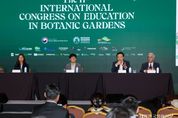
Lim Tae-hee, Superintendent of Gyeonggi Provincial Office of Education, “Ecological environment education linked to world botanical gardens and arboretums to continue at Gyeonggi Shared Schools” Special session hosted by Gyeonggi Provincial Office of Education at the 11th World Botanical Gardens Education Conference
The Gyeonggi-do Office of Education held a special session on the theme of “A New Direction for Education: Cooperation between Local Communities and Public Education” at the 11th International Conference on Education in Botanical Gardens (ICEBG) held at COEX on the 9th. The 11th International Conference on Education in Botanical Gardens and Arboreta is held to share educational ideas from botanical gardens and arboreta around the world and promote the excellence of domestic and international botanical garden and arboretum education. The conference, which runs from the 9th to the 13th, is being held in Korea for the first time in East Asia. During the event, more than 1,500 people from 70 countries are expected to participate. Previously, the Gyeonggi-do Office of Education signed a business agreement with the Forest Service in 2024 to expand the operation of eco-friendly and environmental programs for students. Through the Gyeonggi Shared School operated by the National Arboretum, the office is actively leading the way in eco-friendly and environmental education by teaching students about the relationship between humans and plants and animals, and practicing sustainable forest ecology education in the era of climate crisis. In recognition of these efforts, the Gyeonggi-do Education Office has been invited to participate in the special session of the World Botanic Gardens Education Conference. At the special session, Kim Hye-kyung, Director of the Regional Education Policy Division, presented on “Community Collaboration-Based Biodiversity and Plant Education: Gyeonggi Shared School.” She showcased examples of Gyeonggi Shared School operations related to biodiversity and plant education, as well as the achievements of ecological and environmental program operations, in collaboration with local education support offices and local governments in regions including Yangpyeong, Yangju, Iwol, Siheung, Gwacheon, Anyang, and Goyang. In his presentation at the special session, Superintendent Lim Tae-hee said, “The Gyeonggi Provincial Office of Education is practicing carbon-neutral ecological education to ensure that the earth, the home of all humankind, can be preserved in a sustainable manner through the coexistence of nature and humans.” He added, “We will continue to promote ecological education linked to world botanical gardens and arboretums through Gyeonggi Shared Schools.” He added, “At Gyeonggi Shared Schools, students participate in environmental protection activities in a more fun and practical way with support from various educational programs and materials.” He emphasized, “Gyeonggi education strives to nurture students into citizens who contribute to global environmental conservation through education and practice.” Im concluded, “We look forward to active collaboration with all of you attending the World Botanical Garden Education Conference in connecting ecological and environmental sites with education. I hope this time will serve as a starting point for positive changes in ecological and environmental education at botanical gardens and arboretums around the world.” [News Source: Gyeonggi-do Office of Education]
- 관리자 기자
- 2025-06-09 21:41
-
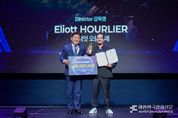
Jeju Island, the age of AI... Seeking coexistence between humans and technology
At the 2025 Jeju AI International Film Festival, domestic and international experts gathered to discuss the possibility of coexistence between artificial intelligence (AI) and art. Jeju Special Self-Governing Province announced on the 9th that the “AI & Art Forum” was held at the Jeju Content Promotion Agency's Be IN+ Performance Hall as the second day of the “2025 Jeju AI International Film Festival.” The Leaders' Dialogue, held in the first part of the forum, explored the direction of technology and art in the AI era under the theme “Technology (術); Art (術). The Art of Coexistence (術).” Lee Joon-ho, policy advisor to Jeju Province, served as the moderator, and Oh Young-hoon, governor of Jeju Province; Kim Dae-sik, professor at KAIST; Yang Yoon-ho, vice chairman of the Korean Film Council; Yang Eun-hee, director of the Jeju Kim Chang-yeol Art Museum; and Lee Tae-ri, vice chairman of the Korean Film Directors Association, participated as panelists. The discussion covered topics such as the development of AI and the crisis facing art, the possibility of coexistence between AI and art, and the direction of the Jeju AI International Film Festival. Governor Oh Young-hoon explained the background behind the Jeju AI International Film Festival, stating, “Rather than following the trend of this period of great transformation, we believe that we must take the lead. We announced Jeju's AI and digital transformation roadmap and believe that film is the best medium to convey this message to the residents of Jeju and the people of Korea.” He added, “We will build a global platform for AI creation in Jeju by establishing a robust power infrastructure and data centers and nurturing talent.” Professor Kim Dae-sik remarked, “AI is an excellent tool that can amplify the capabilities of creators,” and predicted, “In the AI era, the core of competition will be who can utilize AI more effectively.” Vice Chairman Yang Yoon-ho analyzed, “AI has learning effects, but it is difficult to incorporate basic desires, so it is difficult for AI to become the ultimate creator,” and expressed his belief that “ultimately, people who use AI as a useful tool will become good creators.” Yang Eun-hee, Director, remarked, “Looking back at the history of art, AI is not as astonishing as the invention of photography or film.” She evaluated, “Although AI may seem unfamiliar now, it will become a useful tool that provides new resources for creators.” Vice Chairman Lee Tae-ri said, “As AI films are developing rapidly every year, it is time for humans to evolve in step with them,” expressing his hope that “the Jeju AI International Film Festival will play a major role in making South Korea an AI powerhouse.” At the Jeju Global AI Film Competition Awards Ceremony held earlier, awards were presented to the finalists selected from 1,210 entries from 95 countries. The Grand Prize went to French director Elliot Orlie for his film Evolution, while the Best Film Award went to director Ahn Tae-hee for his film Let's Sunnulim, which drew attention for showcasing Jeju's unique community culture. Additionally, global award winners from Iran, Singapore, China, and other countries visited Jeju to participate in the award ceremony. The Grand Prize and Excellence Award recipients received cash prizes, trophies, and a one-year subscription to Adobe's Creative Cloud as additional awards. During the second part of the forum, the Global Fusion Discussion session, themed “AI for Good, AI for JEJU,” featured participants including the UNESCO East Asia Regional Office's Cultural Affairs Officer (Duan Bit Han), the Brazilian Embassy in Korea's Education Affairs Officer (Carlos Gorito), and AI instructors and students from Brazil's AI art class, who explored the future of AI art education. The event also reviewed the outcomes of the “Jeju Culture Global AI Art Class” program, which was jointly organized by Jeju Province and the UNESCO East Asia Regional Office and targeted 11 countries including Brazil, Mongolia, and Colombia, and discussed the positive impact of AI led by Jeju. Following the forum, corporate lectures by Adobe and Google Cloud were held. This was followed by screenings of invited works such as “Wind, Dream” by the Korean National University of Arts (K-Arts) A&T Lab and “I'm PoPo” by director Kim Il-dong, as well as the Grand Prize and Excellence Award-winning works from the Jeju Global AI Film Competition, along with director Q&A sessions (GV). In the event hall lobby, KT's catering robots, SW Future Fulfillment's AI robot soccer, AI Go, Adobe Korea's creative generative AI model “Adobe Firefly” experience booth, Naver Hyperclova X experience booth, and over 100 video and image works created by students from the Jeju Culture Global AI Art Class were on display, attracting much attention. On the third day of the Jeju AI International Film Festival on the 10th, screenings will begin with ‘Wind, Dream,’ followed by nine award-winning films (Grand Prize to Merit Award) and honorable mentions. Additionally, KBS Jeju AI Production Research Society will screen ‘Forgotten Jeju Horse, Hero Reckless,’ followed by a discussion with the directors of the award-winning films. [News Source: Jeju Province]
- 관리자 기자
- 2025-06-09 21:30
-
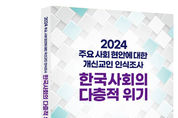
The Crisis in Korean Society as Seen through the Eyes of Protestants, “Protestants' Perceptions of Major Social Issues in 2024,” Released
The Korea Institute for Christian Social Affairs (KICSA) has released a report on Protestant perceptions of major issues in Korean society, “2024 Protestant Perceptions of Major Social Issues: Multilayered Crisis in Korean Society,” has been published. The book compares the differences in perceptions between Protestants and non-Protestants in four areas: politics, religion, climate and ecology, and gender, and analyzes the nature of the multi-layered crisis facing Korean society. Each year, the organization has selected a major social issue and its connection to the Protestant faith to examine the perceptions of Protestants and non-Protestants. In 2024, the study focused on issues shaping contemporary Korean society, including the government of Yoon Seok-yul and the political situation before the impeachment, religious change, the climate crisis, and gender conflict. The research was commissioned by Korea Research and conducted through a web survey of 1,058 Protestants and 1,094 non-Protestants aged 18 and over nationwide. The sample was selected to reflect the October 2024 resident registration demographics, with a sampling error of ±3.0 percentage points at the 95 percent confidence level. This book is a joint research project by four theologians, Dr. Jinsoon Song (Lecturer, Department of Christianity, Ewha Womans University), Dr. Ik-Sang Shin (Professor, Graduate School of Theology, Anglican University), Dr. Kyung-Il Jung (Research Professor, Institute of Theological Studies, Anglican University), and Dr. Hyung-Mook Choi (Director, Third Age Christianity Research Institute). The report analyzed the perceptions of Protestants and non-Protestants in four key areas: political society, religion, climate ecology, and social gender. In the area of political society, the report compared the differences in perceptions between Protestants and non-Protestants, focusing on the evaluation of the Yoon administration, foreign policy, and the advent of the AI society. In particular, it pointed out that the conservatism of Protestants transcends political ideology, emphasizing the need for national sovereignty and social solidarity in the face of impeachment. In the field of religion, we reflected on the role of Protestantism in an era of increasing de-religionization and de-churchization, and analyzed the spread of hatred and discrimination. It explored the reasons for the persistence of social and cultural conservatism in the Protestant faith and provided directions for future religious policies. In the area of climate ecology, we analyzed the emotional reactions of Protestants and non-Protestants to the climate crisis and their attitudes toward government policies. It pointed out the contradictory attitude of recognizing the seriousness of the climate crisis but not taking action, and emphasized the environmental responsibility of Protestants. In the area of socio-gender, the study found that gender inequality and gender conflict are key issues, in addition to job security and housing stability, to address the declining birthrate. He pointed out that the Protestant concept of the normal family is rigid, and sought the direction of social change needed in the era of the population cliff. “We are passing through a very critical historical juncture, and if we do not properly grasp the causes of the crisis and find healthy alternatives, we will fall into an irreversible spiral,” said Dr. Seungmin Shin in the foreword, emphasizing that he hopes the research will serve as a step toward social reform and church renewal. The book includes an overview of the research and its direction, as well as detailed findings in the areas of politics, religion, climate ecology, and gender. It also includes survey questions for both Protestants and non-Protestants, providing a detailed look at the research process. The book is not for sale, and detailed findings and survey questions can be found on the article's website at https://jpic.org. [News Source: Portal News (Gookak Times)]
- 관리자 기자
- 2025-03-02 12:32
-
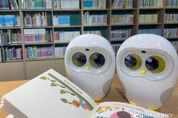
Book-reading robot rental service launched, Yuseong-gu, Daejeon, South Korea
Yuseong-gu, Daejeon, announced on March 27 that it has started a book-reading robot rental service utilizing AI (artificial intelligence) vision technology. The service is aimed at childcare institutions such as daycare centers, kindergartens, and community childcare centers in the district, and one robot and more than 50 exclusive books are rented for a month on a first-come, first-served basis. The reading robot (Luka) is equipped with a function that analyzes images and reads the story on the page while flipping through the book, and can also sing songs and play simple games. It is expected to provide children with a new reading experience where they can read and interact with a robot. Rental applications are available on the Yuseong-gu Integrated Library website until March 10, and inquiries can be made to Agarang Library. “I hope that children can experience the joy of reading books in a new way with a robot that reads to them and expand their imagination to their heart's content,” said Yuseong-gu Mayor Jung Yong-rae. ”We will support children to provide them with a variety of interesting reading experiences.” [News source: Yuseong-gu, Daejeon]
- 관리자 기자
- 2025-03-02 12:23
-
 Entertainment · Broadcasting
Fair Play Menarini International Award, 29th Award Ceremony marked by waves of emotion
Entertainment · Broadcasting
Fair Play Menarini International Award, 29th Award Ceremony marked by waves of emotion
-
 Entertainment · Broadcasting
The Rose, the first Korean band to perform at Coachella, confirms Seoul concert on August 30 for “Once Upon a WRLD”
Entertainment · Broadcasting
The Rose, the first Korean band to perform at Coachella, confirms Seoul concert on August 30 for “Once Upon a WRLD”
-
 Culture · Events
Incheon Port Authority kicks off the 6th Incheon International Marine Forum in Songdo, Incheon, to look into the future of the global marine industry
Culture · Events
Incheon Port Authority kicks off the 6th Incheon International Marine Forum in Songdo, Incheon, to look into the future of the global marine industry
-
 Culture · Events
Seocho Symphony Orchestra to hold performances in Berlin, Germany, and London, England, commemorating the 80th anniversary of liberation and the 75th anniversary of the Korean War
Culture · Events
Seocho Symphony Orchestra to hold performances in Berlin, Germany, and London, England, commemorating the 80th anniversary of liberation and the 75th anniversary of the Korean War
-
 Culture · Events
Gyeonggi Province to hold its largest job fair for middle-aged and older workers on the 9th. 1,000 jobs to be filled.
Culture · Events
Gyeonggi Province to hold its largest job fair for middle-aged and older workers on the 9th. 1,000 jobs to be filled.
-
 International
Jeju's soul resonates in Rome... Singing of the pain and reconciliation of Jeju 4·3
International
Jeju's soul resonates in Rome... Singing of the pain and reconciliation of Jeju 4·3
-
 International
Seoul City establishes a foothold for K-Beauty and fashion to enter the European market, promoting Milan as a base
International
Seoul City establishes a foothold for K-Beauty and fashion to enter the European market, promoting Milan as a base
-
 Medical · Health
Korean Centers for Disease Control and Prevention: Increase in hand, foot, and mouth disease among infants and young children! Follow preventive measures and maintain good hygiene to stay healthy.
Medical · Health
Korean Centers for Disease Control and Prevention: Increase in hand, foot, and mouth disease among infants and young children! Follow preventive measures and maintain good hygiene to stay healthy.
-
 Medical · Health
Korean Centers for Disease Control and Prevention: Injured patients account for the largest proportion of hospitalized patients; falls are the main cause
Medical · Health
Korean Centers for Disease Control and Prevention: Injured patients account for the largest proportion of hospitalized patients; falls are the main cause
-
 Medical · Health
WHO and international health experts visit Wanju local food production sites
Medical · Health
WHO and international health experts visit Wanju local food production sites
-
2026-01-29 23:44
11
-
2026-01-28 23:36
No. 6 Reporter
-
2025-12-09 14:30
Seong Ki-sun's Book Launch Event ‘Education in Turmoil’...Seeking Hope for Public Education Through Basic, Relationship, Growth (BRG)
-
2025-11-04 13:48
JP EDU - Hidden Opportunities in Japan: English-Taught International Studies Programs Open Doors to Prestigious Universities
-
2025-10-27 11:03
2026 대한민국영어신문 주니어 영어 기자단 모집





















